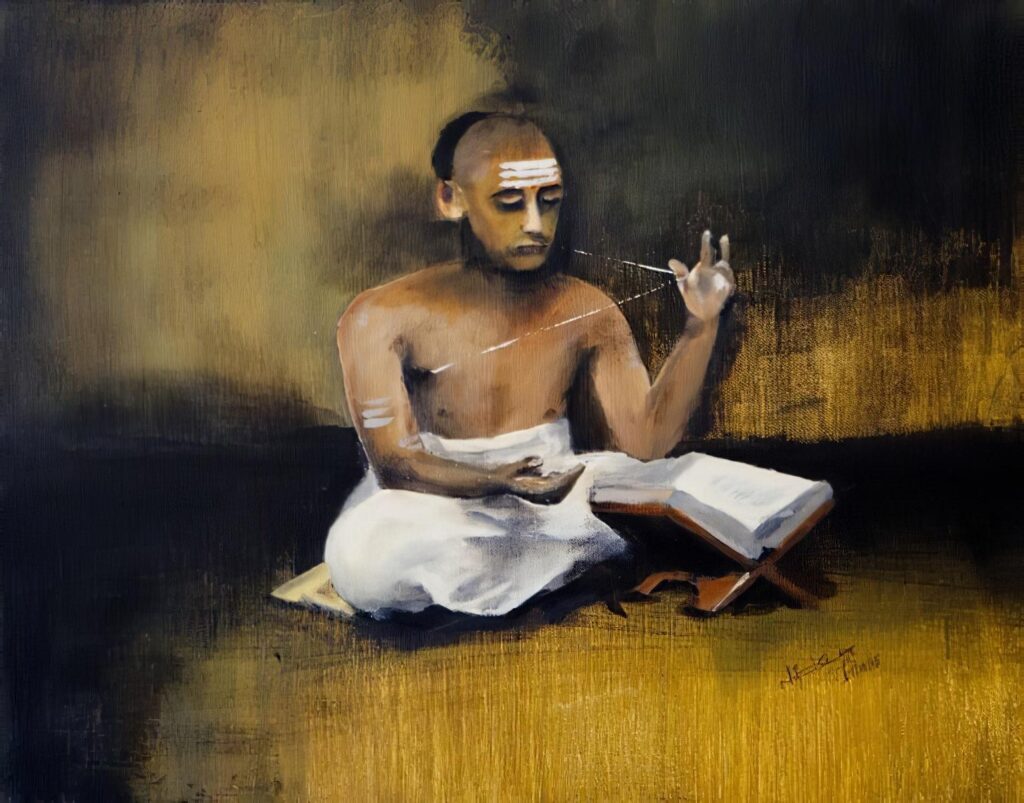When Pariksit Maharaja decided to renounce the kingdom and fast until death, the situation was so uncommon that all of the most prominent sages of the universe appeared at the scene. How could a powerful king like Maharaja Pariksit, who had everything desirable, renounce everything like that?
The catalyst for the renunciation of Maharaja Pariksit was the curse of Śṛṅgi, the son of the sage Samika, who cursed Maharaja Pariksit to die in seven days, bitten by a winged snake, after hearing that he had disrespected his father.
Despite his young age, he had been trained by his father as a brahmacary and was thus already powerful as a qualified Brahmana. Prabhupada mentions that this was a testament to the good governance of the king, who managed the world so well that even a child playing with other small boys was already so powerful that he could curse a king. However, under the influence of Kali-yuga, this power was mixed with pride and led to him ignorantly cursing the King.

This was the beginning of the downfall of the Brahminical order. As Prabhupada mentions: “Hatred of the lower orders of life began from this brāhmaṇa boy, under the influence of Kali, and thus cultural life began to dwindle day after day.” Under the influence of the age of Kali, Brahmanas became proud and this led them to lose their powers and Brahminical culture and eventually create the caste system, which is a demoniac system. The caste system in turn led to the abolition of the Varnasrama system and the establishment of democracy, which is also not a very good form of government. Prabhupada makes the point that one should remove the deviations in the Varnasrama system introduced by the degraded Brahmanas of Kali-yuga, such as the caste system, and not reject the system as a whole.
Prabhupada mentions that in the Varāha Purāṇa is mentioned that demons who acted inimically toward the Lord but were not killed by him were allowed to take birth in the families of brāhmaṇas to take advantage of the Age of Kali. The Lord gave them a chance to have their births in the families of pious brāhmaṇas so that they could progress in spiritual life. The demons, however, became proud of taking birth as Brahmanas and misused the opportunity.
Śṛṅgi himself felt he had made a mistake, and thus he went back to his father and started to cry, breaking his meditation. Coming to his external senses, the sage noticed the dead snake around his neck but didn’t give it much importance, just throwing it away. The whole incident was not very serious. The sage failed to properly receive the king, and Pariksit put the dead snake around the neck of the sage. It would be inconsequential if not for the curse of the boy.
Seeing his son crying, the sage asked if anyone had done him harm. When the child finally explained what happened, the sage became very sorry, saying: “Alas! What a great sinful act was performed by my son. He has awarded heavy punishment for an insignificant offense.”
The sage then explained to the boy the consequences of his acts, describing things that happen when monarchical regimes conducted by saintly kings are abolished. These are all symptoms that have become common in our age:
a) The whole world becomes filled with thieves who harass the general population.
b) Great social disruption due to the plundering of the people’s wealth by rogues and thieves.
c) People are killed and injured.
d) Animals are stolen and women kidnapped.
e) People in general fall systematically from the path of a progressive civilization following the Varnasrama system.
f) People become more attracted to economic development and sense gratification, adopting a hedonistic lifestyle that results in unwanted children on the level of dogs and monkeys.
In Kali-yuga, the degradation started with the Brahmanas becoming proud and demanding respect and privileges based on their birth. As a result, the Ksatriyas rebelled against the degraded Brahamnas and started to rule independently from their advice. As a result, the headless Ksatriya class also became degraded, adopting a hedonistic lifestyle and living opulently due to the exploitation of the merchant class and peasants, misusing the resources of the state for wars and vanity projects. This led the merchants to rebel, establishing the capitalist system, becoming greedy, and exploiting the working classes. This eventually led to the workers rebelling and implementing the communist system, which is the diametrically opposite of the Varnasrama system, resulting in the spread of atheism and the greatest miseries.
Lamenting, again and again, the unjust curse of such a saintly king, the rsi prayed to the Lord, so his son could be excused:
“Then the ṛṣi prayed to the all-pervading Personality of Godhead to pardon his immature boy, who had no intelligence and who committed the great sin of cursing a person who was completely free from all sins, who was subordinate and who deserved to be protected.” (1.18.47)
Different from Pariksit Maharaja, Śṛṅgi was not a soul surrendered to the Lord. He was proud and propense to anger. The Lord just used his tendency to facilitate the pastime and inspired the father to pray for the son, so he could be excused. In his purport, Prabhupada mentions that “all the foolish sons of brāhmaṇas are warned hereby not to become as foolish as Śṛṅgi and to be always on guard against the demoniac qualities which they had in their previous births. The foolish boy was, of course, excused by the Lord, but others, who may not have a father like Śamīka Ṛṣi, will be put into great difficulty if they misuse the advantages obtained by birth in a brāhmaṇa family.”
